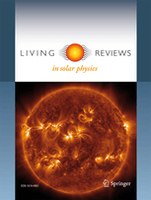
Living Reviews in Solar Physics
metrics 2024
Advancing Knowledge in Solar Physics
Introduction
Living Reviews in Solar Physics is a premier open access journal published by Springer International Publishing AG, dedicated to the dynamic field of solar physics. Since its inception in 2004, this journal has provided a platform for comprehensive and up-to-date reviews that cover the latest developments in solar research, making it an invaluable resource for researchers, professionals, and students alike. With an impressive Q1 ranking in both Astronomy and Astrophysics and Space and Planetary Science as of 2023, it ranks in the top 3% of journals in its field according to Scopus. The journal's commitment to open access ensures that groundbreaking research is disseminated widely, fostering collaboration and innovation. As it continues to evolve through to its converged years from 2004 to 2024, Living Reviews in Solar Physics remains a crucial outlet for advancing our understanding of solar phenomena and their implications for astrophysics and planetary science.
Metrics 2024
 7.47
7.47 23.00
23.00 24.60
24.60 68
68Metrics History
Rank 2024
Scopus
IF (Web Of Science)
JCI (Web Of Science)
Quartile History
Similar Journals

Bulgarian Astronomical Journal
Charting New Territories in Astronomical ResearchThe Bulgarian Astronomical Journal, published by the BULGARIAN ACADEMY OF SCIENCES, INSTITUTE OF ASTRONOMY, serves as a vital platform for the dissemination of research in the field of Astronomy and Astrophysics. With the ISSN 1313-2709 and E-ISSN 1314-5592, this journal has been pivotal in showcasing original studies and advancements in astronomical sciences from 2014 and will continue to do so through 2025. Although categorized in Q4 within the ambit of Astronomy and Astrophysics, it provides essential insights and innovative findings, making significant contributions to the global academic community. Positioned in the lower quartile of Scopus rankings, recognized as #87 out of 90, it offers an opportunity for burgeoning researchers and seasoned professionals alike to engage with emerging ideas and trends in the discipline. While it currently does not feature an open access model, readers and contributors can anticipate a rich exchange of scientific knowledge that fosters collaboration within the astronomy community.
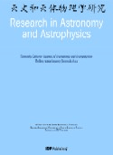
Research in Astronomy and Astrophysics
Advancing Knowledge in the Cosmos.Research in Astronomy and Astrophysics, published by the National Astronomical Observatories under the Chinese Academy of Sciences, stands out as a pivotal platform for disseminating cutting-edge research in the fields of astronomy and astrophysics. With an ISSN of 1674-4527 and an E-ISSN of 2397-6209, this esteemed journal operates as an open access publication, ensuring that high-quality research is available to a broad audience without any financial barriers. As of 2023, it holds a commendable Q2 quartile ranking in both Astronomy and Astrophysics, as well as Space and Planetary Science, reflecting its importance and revered position among leading journals. Spanning from 2009 to 2024, it is geographically rooted in the United Kingdom but engages a global readership and author base, making significant contributions to the rapidly evolving discourse in astrophysical studies. Moreover, its rankings in Scopus underscore its relevance, ranking 43rd out of 90 in Astronomy and Astrophysics and 61st out of 104 in Space and Planetary Science, placing it firmly within the competitive landscape of scientific research. Research in Astronomy and Astrophysics is dedicated to fostering innovation and communication within the scientific community, offering researchers, professionals, and students alike a valuable resource for collaboration and knowledge advancement.

SPACE WEATHER-THE INTERNATIONAL JOURNAL OF RESEARCH AND APPLICATIONS
Exploring the Cosmic Impact on EarthSPACE WEATHER: THE INTERNATIONAL JOURNAL OF RESEARCH AND APPLICATIONS, published by the American Geophysical Union, is an influential journal dedicated to advancing the understanding of space weather phenomena and their applications. With an E-ISSN of 1542-7390 and a commendable Q2 ranking in the Atmospheric Science category for 2023, this journal serves as a vital platform for researchers, professionals, and students alike. The journal intersects multiple disciplines, including Earth and planetary sciences, focusing on how solar and cosmic phenomena affect the Earth's atmosphere and space environment. With its convergence years extending from 2005 to 2024, SPACE WEATHER aims to publish high-quality research that contributes to our understanding of these critical areas, fostering new ideas and technologies. Its strategic position in the Scopus ranking, being in the 69th percentile, highlights its integral role in the academic community, driving innovation and collaboration in this essential field.
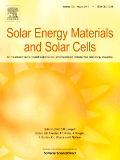
SOLAR ENERGY MATERIALS AND SOLAR CELLS
Leading the Charge in Solar Energy ResearchSOLAR ENERGY MATERIALS AND SOLAR CELLS is a distinguished academic journal published by Elsevier, based in the Netherlands, focusing on innovative research in the fields of materials science and renewable energy. With a substantial history dating back to 1970, the journal has evolved into a premier platform for disseminating advanced studies related to solar energy technologies, including the development and optimization of solar cells and materials. Recognized for its high impact, the journal maintains a Q1 ranking across multiple relevant categories such as Electronic, Optical and Magnetic Materials, Renewable Energy, Sustainability and the Environment, and Surfaces, Coatings, and Films. It ranks impressively within the top tiers of Scopus, showcasing its influence and relevance in the scientific community. Although it does not offer open access, the journal remains a crucial resource for researchers, professionals, and students aiming to contribute to the advancement of sustainable energy technologies and materials innovation.

COSMIC RESEARCH
Unveiling Cosmic Insights Through Rigorous ScholarshipCOSMIC RESEARCH is a prestigious academic journal dedicated to advancing the field of space science, particularly within the domains of aerospace engineering, astronomy, and planetary science. Published by MAIK NAUKA/INTERPERIODICA/SPRINGER, this journal has been a significant contributor to the scholarly discourse since its inception in 1968, with converged years showing robust publication activity until 2024. With a Q4 category ranking in various disciplines, including aerospace engineering, astronomy, and space science, the journal serves as a platform for disseminating innovative research and comprehensive reviews. Although not currently offering open access, COSMIC RESEARCH is renowned for its rigorous peer-review process, ensuring that only high-quality research is shared with the academic community. The journal's ISSN is 0010-9525 and its E-ISSN is 1608-3075. Researchers, professionals, and students alike can benefit from the insights and findings presented in this journal, making it an essential resource for anyone involved in the exploration of cosmic phenomena.
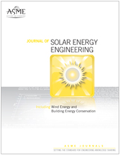
JOURNAL OF SOLAR ENERGY ENGINEERING-TRANSACTIONS OF THE ASME
Shaping the Future of Renewable Energy Technologies.JOURNAL OF SOLAR ENERGY ENGINEERING-TRANSACTIONS OF THE ASME is a premier publication dedicated to advancing the field of solar energy engineering, under the auspices of the prestigious American Society of Mechanical Engineers (ASME). With the ISSN 0199-6231 and E-ISSN 1528-8986, this journal has established itself as a critical resource for researchers and professionals alike, particularly in the areas of energy engineering and renewable technology. Currently enjoying an impact factor that places it in the Q2 category for Energy Engineering and Power Technology and Q3 for Renewable Energy, Sustainability, and the Environment, this journal effectively bridges impactful research and practical application. Spanning contributions from 1980 to 2025, the journal emphasizes empirical studies, innovative methodologies, and sustainable solutions that resonate with the growing global demand for renewable energy. The journal’s commitment to quality is reflected in its competitive Scopus rankings: 97th out of 272 in Energy Engineering and 124th out of 270 in Renewable Energy. Although not an Open Access journal, it remains a vital forum for disseminating research that shapes our energy future. Located in New York, this journal serves as a cornerstone for those in academia and industry to stay abreast of the latest advancements in solar energy technologies and their application in sustainable development.
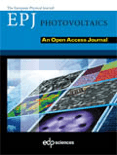
EPJ Photovoltaics
Connecting researchers to the global solar energy discourse.EPJ Photovoltaics, published by EDP Sciences S.A., is a distinguished open-access journal dedicated to advancing the field of photovoltaic research and technology. Established in 2011, and operating from France, the journal serves as a vital platform for researchers, professionals, and students interested in the innovative possibilities of solar energy conversion. With a broad scope encompassing condensed matter physics, electrical and electronic engineering, and renewable energy, EPJ Photovoltaics boasts a commendable Q2 ranking in key categories as of 2023, showcasing its relevance and impact in the scientific community. Researchers will find an opportunity to disseminate their findings effectively, as the journal offers rapid publication options that align with the fast-paced evolution of the field. This publication not only contributes to academic discourse but also plays a crucial role in addressing global energy challenges, making it an essential resource for anyone invested in the future of sustainable energy technologies.
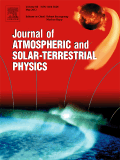
JOURNAL OF ATMOSPHERIC AND SOLAR-TERRESTRIAL PHYSICS
Connecting Research Across the Atmosphere and CosmosJournal of Atmospheric and Solar-Terrestrial Physics, published by Pergamon-Elsevier Science Ltd, stands as a pivotal academic resource in the realms of Atmospheric Science, Geophysics, and Space and Planetary Science. With an ISSN of 1364-6826 and an E-ISSN of 1879-1824, this journal encompasses a robust collection of research findings and reviews that address the intricacies of atmospheric processes and solar-terrestrial interactions. The journal has shown consistent academic performance, earning commendable rankings in 2023, including Q3 in Atmospheric Science and Q2 in Geophysics, reflecting its importance for scholarly communication and advancement in these fields. Spanning an impressive convergence of research from 1997 to 2024, it aims to foster interdisciplinary collaboration and inspire innovations among researchers, professionals, and students. Although it currently does not offer open access, the journal is committed to disseminating high-quality content that continues to drive forward our understanding of complex environmental phenomena.
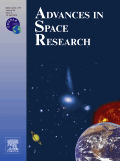
ADVANCES IN SPACE RESEARCH
Unveiling the Mysteries of Space and Beyond.ADVANCES IN SPACE RESEARCH, published by Elsevier Science Ltd, is a leading journal in the fields of Aerospace Engineering, Astronomy and Astrophysics, Atmospheric Science, and more. Since its inception in 1981, this journal has dedicated itself to the dissemination of high-quality research contributing to the understanding of space and planetary sciences through a multidisciplinary lens. With an impressive impact factor reflected in its positioning within the Q1 and Q2 quartiles across various categories, it serves as an essential resource for researchers and professionals alike. The journal's rigorous peer review process ensures that only the most relevant and groundbreaking studies are published, making it a cornerstone for those navigating the complexities of space research. The journal is accessible by subscription, inviting a global readership to engage with trailblazing research that influences future advancements and fosters collaborations across the scientific community. With a reputation for excellence, ADVANCES IN SPACE RESEARCH remains committed to pushing the boundaries of knowledge in the ever-evolving field of space exploration.

SOLAR SYSTEM RESEARCH
Pioneering Research in the Realm of Planets and StarsSOLAR SYSTEM RESEARCH, published by Pleides Publishing Inc, offers a comprehensive platform for the exploration and dissemination of scientific knowledge in the fields of Astronomy, Astrophysics, and Space and Planetary Science. With its origins tracing back to 1969, this journal provides a vital resource for researchers and professionals seeking to deepen their understanding of the solar system's complexities, including planetary formation, extraterrestrial geology, and the dynamics of celestial bodies. Although categorized in the Q4 quartile for both relevant disciplines, SOLAR SYSTEM RESEARCH remains committed to publishing high-quality research that contributes to advancing contemporary scientific discourse. Dedicated to fostering collaboration and innovation, the journal is indexed in Scopus and adheres to rigorous academic standards, making it an essential resource for students and professionals alike pursuing the latest developments in solar system studies.